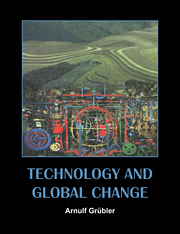6 - Industry
from PART II - TECHNOLOGY AND THE ENVIRONMENT: NATURAL AND HUMAN
Published online by Cambridge University Press: 05 February 2015
Summary
Synopsis
The chapter starts with a brief quantitative overview of global industrial expansion and the disparities that remain between centers of industrialization and those regions that are catching up. Overall expansion has been enormous. It has been possible only through successive replacements of manufacturing technologies, materials, and energy sources, and through continuing improvements in the organization of industrial production. These changes have yielded enormous productivity gains in labor, materials, and energy use per unit of production. Such productivity gains have sustained increasing levels of industrial Output, increased work force incomes, and reduced working time. Productivity gains have also eased the demands on natural resources and reduced traditional environmental impacts such as indoor and urban air pollution. At the same time, however, new environmental concerns have emerged at the global level. Synthetic substances are depleting the ozone layer, and increased concentrations of greenhouse gases, mostly from fossil energy combustion, are causing global warming. Historically, environmental productivity gains have been outpaced by output growth. Only in the last two decades have gradually saturating demands in bulk materials combined with continued productivity increases resulted in near stabilization of materials and energy use in the most advanced industrial countries. The history of energy and carbon use illustrates the predominant pattern. Energy use per unit of economic output has declined by 1% per year, and carbon emissions per unit of energy use has declined by 0.3% per year. This is a combined carbon productivity increase of 1.3% per year.
- Type
- Chapter
- Information
- Technology and Global Change , pp. 195 - 290Publisher: Cambridge University PressPrint publication year: 1998



